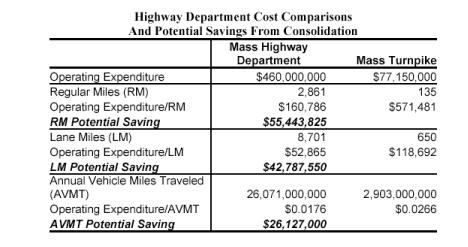For Immediate Release:
Wednesday, June 21, 2002
10:00 a.m.
Contact: Frank Conte
Director, Communications & IS
617-573-8750BHI analysis: Turnpike-Highway consolidation would be a money-saver
Mitt Romney, Republican candidate for governor, has proposed the consolidation of the Massachusetts Turnpike Authority and the Massachusetts Highway Department. The Beacon Hill Institute at Suffolk University (BHI) has found that this proposal could save the Commonwealth as much as $55 million per year.
BHI made three cost comparisons between the Turnpike and the Massachusetts Highway Department. The comparisons were made in terms of (1) number of “regular miles,” that is, length of road, (2) number of lane miles (number of regular miles times number of lanes) and (3) annual vehicle miles traveled.1 Using these comparisons, BHI developed a range of estimates of how much the Commonwealth would save if the proposed consolidation of the Turnpike into Mass Highway took place.
BHI found that, for each measure, per-unit operating expenditure was substantially lower for Mass Highway than for the Turnpike. For example, operating expenditure per regular mile was $160,786 for Mass Highway and $571,481 for the Turnpike. Data are for 2000.
The estimated saving from consolidating the Turnpike into Mass Highway, for each measure (see table) is: (1) Regular miles: $55,443,825 (2) Lane miles: $42,787,550, (3) Annual vehicle miles traveled: $26,127,000.2 All cost comparisons exclude the cost of toll collection on the Turnpike.

BHI's analysis shows that the state could benefit from substantial cost savings and efficiency gains if the Romney proposal were accepted.
1Annual vehicle miles traveled = average daily traffic count between turnpike exits * 365 * mileage between exits.
2 Cost savings are derived by multiplying the difference in operating expenditure by the appropriate Turnpike measure: regular miles, lane miles or annual vehicle miles traveled.
HTML format revised on 04-Feb-2005 10:41 AM